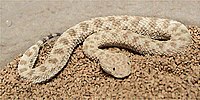Cerastes vipera
Jump to navigation
Jump to search
| Cerastes vipera | ||||||||||||||||||||
|---|---|---|---|---|---|---|---|---|---|---|---|---|---|---|---|---|---|---|---|---|
 | ||||||||||||||||||||
| Scientific classification | ||||||||||||||||||||
| ||||||||||||||||||||
| Binomial name | ||||||||||||||||||||
| Cerastes vipera (Linnaeus, 1758) | ||||||||||||||||||||
| Synonyms | ||||||||||||||||||||
|
Common names: Sahara sand viper, Avicenna viper.[2]
Cerastes vipera is a venomous viper species found in the deserts of North Africa and the Sinai Peninsula. Small and stout, it has a broad, triangular head with small eyes set well forward and situated on the junction of the side and the top of the head. A true desert species.[2][3] No subspecies are currently recognized.[4]
Description
Averages 20-35 cm in length, with a maximum of 50 cm. Females are larger than males.[2]
Geographic range
Arid North Africa: Mauritania, Western Sahara, Morocco, Algeria, Mali, Tunisia, Libya, Niger, Chad and Egypt. Sinai Peninsula: Egypt and Israel. The type locality given is "AEgypto" (Egypt).[1]
See also
- Cerastes.
- List of viperine species and subspecies.
- True vipers - Common names.
- True vipers - Synonymy.
- Snakebite.
Cited references
- ↑ 1.0 1.1 McDiarmid RW, Campbell JA, Touré T. 1999. Snake Species of the World: A Taxonomic and Geographic Reference, vol. 1. Herpetologists' League. 511 pp. ISBN 1-893777-00-6 (series). ISBN 1-893777-01-4 (volume).
- ↑ 2.0 2.1 2.2 Mallow D, Ludwig D, Nilson G. 2003. True Vipers: Natural History and Toxinology of Old World Vipers. Krieger Publishing Company, Malabar, Florida. 359 pp. ISBN 0-89464-877-2.
- ↑ Spawls S, Branch B. 1995. The Dangerous Snakes of Africa. Ralph Curtis Books. Dubai: Oriental Press. 192 pp. ISBN 0-88359-029-8.
- ↑ Cerastes vipera (TSN 634965). Integrated Taxonomic Information System. Accessed on 30 July 2006.
External links
- Species Cerastes vipera at the Species2000 Database